Un Heureux Evenement: A Happy Event
- SUBSCRIBE
- ALREADY SUBSCRIBED?
BECOME A BONJOUR PARIS MEMBER
Gain full access to our collection of over 5,000 articles and bring the City of Light into your life. Just 60 USD per year.
Find out why you should become a member here.
Sign in
Fill in your credentials below.
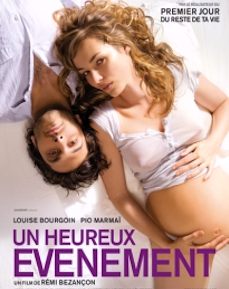 Un Heureux Evenement (A Blessed Event or A Happy Event) is a curious mishmash of a movie you can’t help feeling ambivalent about. The film explores what it means to procreate in contemporary Paris, tracing one couple’s experience from conception through pregnancy, labor, and their new daughter’s infancy. In so doing it moves from romantic comedy and chick flick, with moments of screwball comedy, to satire and realism. It’s disconcerting, but then we think, Yes, this is how life works, and accept the jarring changes. But we also suspect that director Rémi Bezançon simply can’t carry through in any one mode, and so switches gears before running out of steam. The director also tries to ape American directors like Wes Anderson, Terrence Malick, even Woody Allen, with sequences of the young mother’s musings and fantasies. Even when these work, kind of, they come off as pretentious. Bezançon is more effective at the screwball comedy (like the husband’s behavior in the delivery room) and satire (for example, of a militant pro-nursing group).
Un Heureux Evenement (A Blessed Event or A Happy Event) is a curious mishmash of a movie you can’t help feeling ambivalent about. The film explores what it means to procreate in contemporary Paris, tracing one couple’s experience from conception through pregnancy, labor, and their new daughter’s infancy. In so doing it moves from romantic comedy and chick flick, with moments of screwball comedy, to satire and realism. It’s disconcerting, but then we think, Yes, this is how life works, and accept the jarring changes. But we also suspect that director Rémi Bezançon simply can’t carry through in any one mode, and so switches gears before running out of steam. The director also tries to ape American directors like Wes Anderson, Terrence Malick, even Woody Allen, with sequences of the young mother’s musings and fantasies. Even when these work, kind of, they come off as pretentious. Bezançon is more effective at the screwball comedy (like the husband’s behavior in the delivery room) and satire (for example, of a militant pro-nursing group).
Nicolas (Pio Marmaï) and Barbara (Louise Bourgoin) are near-perfect embodiments of the Bobo class, the bohemian-bourgeoisie who dominate the Paris scene nowadays. Barbara is supposed to be a doctoral student, though this mostly comes out in unconvincing intellectualizing with a supercilious advisor. When she first meets Nicolas, he’s working at a video store. They court each other through selectively brandished DVDs, the wittiest moments in the movie. Nicolas eventually becomes an office worker of some very vague kind. What’s sure is that the couple lives in a rambling, well-decorated apartment that would rent for a fortune in real, as opposed to movie, Paris. Why do they have a baby? It’s not clear, and here the implausibility begins.
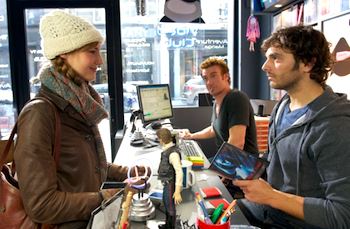 You can’t blame the actors, who make the characters, such as they are, believable. Pio Marmaï ably plays the Hugh Grant part, which means he’s called on to smile a lot. He’s a charming actor, but even better when he has the opportunity to widen his emotional range. For a seemingly nice guy he’s very effective at quiet but seething anger. As for Louise Bourgoin, she’s pretty in a Sarah Jessica Parker chick flick way and has a strong screen presence. But oddly, the more she emotes, the more unsympathetic she is—whether it’s something about the actress or the character she’s playing is hard to say.
You can’t blame the actors, who make the characters, such as they are, believable. Pio Marmaï ably plays the Hugh Grant part, which means he’s called on to smile a lot. He’s a charming actor, but even better when he has the opportunity to widen his emotional range. For a seemingly nice guy he’s very effective at quiet but seething anger. As for Louise Bourgoin, she’s pretty in a Sarah Jessica Parker chick flick way and has a strong screen presence. But oddly, the more she emotes, the more unsympathetic she is—whether it’s something about the actress or the character she’s playing is hard to say.
Concerning childbearing and rearing in Paris, the movie isn’t very true to life. The movie portrays the couple, especially Barbara, as isolated and overwhelmed by parenthood. It’s true that some professional couples, accustomed to autonomy bordering on the insular, turn even more inward when they have children. The film effectively shows how for this bobo couple, having a child is another way to keep their own life under glass. But it’s more typical in France for new parents to be surrounded by their own parents, other relatives, and friends. Nicolas and Barbara seem distant from their parents and friends, which is a shame, because these characters seem more human than the protagonists (and well-played besides). Josiane Balasko, as Barbara’s 70s feminist mother, is especially funny and poignant. If she’d moved in with the couple both they and the movie would have been better off.
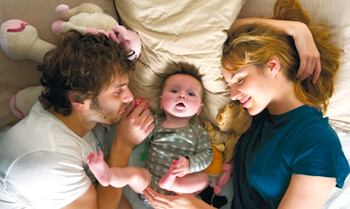 Moreover, the French social system offers a wide range of caregivers: doctors, midwives, physiotherapists, and nurses, not to mention public daycare. The movie is disingenuous when it pokes fun at them, but at the same time wrings tears out of the parents’ misery. The one care-giving bright spot in the film is the Antillaise midwife, all folksy tough-love. But to American eyes this is uncomfortably close to the stereotype of the white-haired, but black-skinned, mammy.
Moreover, the French social system offers a wide range of caregivers: doctors, midwives, physiotherapists, and nurses, not to mention public daycare. The movie is disingenuous when it pokes fun at them, but at the same time wrings tears out of the parents’ misery. The one care-giving bright spot in the film is the Antillaise midwife, all folksy tough-love. But to American eyes this is uncomfortably close to the stereotype of the white-haired, but black-skinned, mammy.
Un Heureux Événement’s portrayal of the baby-making experience may appeal to young folks with little idea of what it really entails. To those of us who do, the movie will seem overwrought and self-important. The bobo sensibility tends to navel-gazing (what the French call nombrilisme), and there’s nothing like a baby to swell one’s navel to elephantine proportions. Our mother exclaims how incredible her baby is: how it’s made such a difference to her, how it’s changed her self-image, given her such responsibility, etc. But the most important thing one learns from parenthood is that it ain’t about you. Indeed, the most engrossing part of the film is when the baby is born and just after. We’re treated to documentary-style footage of the delivery and the newborn’s awakening reactions to the world. No matter how often we’ve seen this kind of thing, it’s always riveting.
When the couple’s relationship goes on the skids, a separation seems to be in store. Well, not quite. The husband manages to make it out of their building before rushing back with second thoughts. The wife does leave, sort of like Meryl Streep in Kramer vs. Kramer, but this being France she goes home to maman. This is the weakest part of the film, especially when we remember Kramer, where the characters did struggle and grow. Here they whine and then make up. Barbara eventually resolves the agonies of motherhood in the ultimate Parisian bobo fashion, by writing a book about it. We suspect it won’t be as deep and sensitive as she thinks, nor as intelligent as her philosophical allusions might indicate. But it just might get adapted into an interesting but very uneven movie.
Production: Mandarin Cinéma
Distributor : Gaumont
Watch the video trailer (French)
Dimitri Keramitas is a Paris-based film writer who reviews the latest French film releases for BonjourParis every other Wednesday. Click on his name to read his past reviews published in BonjourParis.
Subscribe for free so you don’t miss a story & don’t forget our searchable library of 7,000+ stories about France travel. 50 original stories monthly: travel guides, Paris events, dining, lodging, shopping, French lifestyle, recipes, photography & more since 1995.
Shop direct at Amazon.com (and merci for using our direct link—your support allows us to publish BonjourParis)
and check our Francophiles Favorites loaded with French-themed items for travelers and Francophiles. Choose your category at the right edge, then click the category’s last page number to browse the latest listings.
Short-cut to our 100 TOP SELLING ITEMS (please wait for widget to load—updated daily)
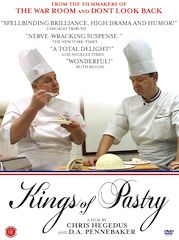
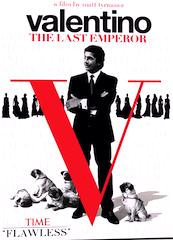
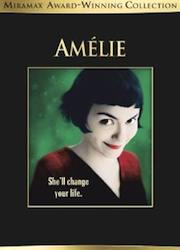
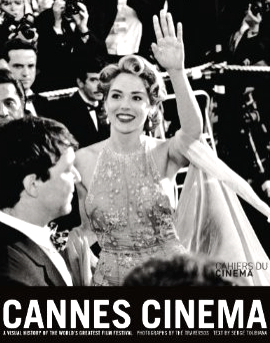
DVD: Kings of Pastry [2009 documentary w/ bonus footage, French & English about the MOF competition. Region 1 for USA & Canadian viewers] most entertaining!
DVD: Valentino: The Last Emperor “Flawless,” wrote TIME magazine reviewer regarding this film about haute couture designer Valentino. See Valentino’s farewell fashion show in Paris show…please read entire review.
DVD: Amelie Every Parisphile’s favorite film…is it in your DVD library?
Book: Cannes Cinema [May 2011 release] A must for serious cinephiles. This is a visual history of the world’s greatest film festival, the Cannes festival, from its beginnings in 1939 to the present day.


Seven Hotel is a modern 4-star designer hotel in on the Left Bank that offers individually-themed rooms created by 4 designers. Free Wi-Fi, air-conditioned, Nespresso machine & iPod docking station in suites. TV has a channel that controls individual room fragrances. Buffet breakfast served mornings in the hotel’s breakfast room or in room upon request. On-site contemporary lounge bar, massage treatments, a private car service. Located near rue Mouffetard “eat-drink” street with charming cafés & daytime classic small shops & market. Satisfied past Booking.com guests rated this stylish hotel 8.6 of 10.
*** Eligible for the Booking.com best price guarantee.

Be smart!
Bookmark this link to the BonjourParis—Booking.com site & use it every time so your preferences are stored & deals are updated when you return. Book, shop around & if you find a better rate for the same deal, contact Booking.com for your BEST PRICE MATCH GUARANTEE.




